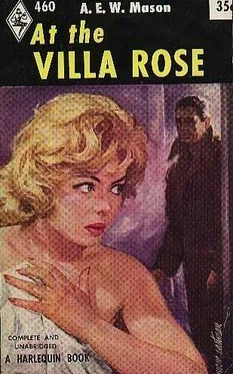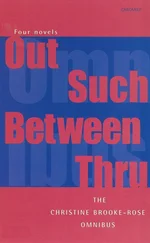A Mason - At the Villa Rose
Здесь есть возможность читать онлайн «A Mason - At the Villa Rose» весь текст электронной книги совершенно бесплатно (целиком полную версию без сокращений). В некоторых случаях можно слушать аудио, скачать через торрент в формате fb2 и присутствует краткое содержание. Год выпуска: 1910, Жанр: Классический детектив, на английском языке. Описание произведения, (предисловие) а так же отзывы посетителей доступны на портале библиотеки ЛибКат.
- Название:At the Villa Rose
- Автор:
- Жанр:
- Год:1910
- ISBN:нет данных
- Рейтинг книги:5 / 5. Голосов: 1
-
Избранное:Добавить в избранное
- Отзывы:
-
Ваша оценка:
- 100
- 1
- 2
- 3
- 4
- 5
At the Villa Rose: краткое содержание, описание и аннотация
Предлагаем к чтению аннотацию, описание, краткое содержание или предисловие (зависит от того, что написал сам автор книги «At the Villa Rose»). Если вы не нашли необходимую информацию о книге — напишите в комментариях, мы постараемся отыскать её.
At the Villa Rose — читать онлайн бесплатно полную книгу (весь текст) целиком
Ниже представлен текст книги, разбитый по страницам. Система сохранения места последней прочитанной страницы, позволяет с удобством читать онлайн бесплатно книгу «At the Villa Rose», без необходимости каждый раз заново искать на чём Вы остановились. Поставьте закладку, и сможете в любой момент перейти на страницу, на которой закончили чтение.
Интервал:
Закладка:
"Yes, yes. Quite so," said Hanaud. "Go on, my friend."
"The interior of the room gaped black," Perrichet resumed. "I crept up to the window at the side of the wall and dashed my lantern into the room. The window, however, was in a recess which opened into the room through an arch, and at each side of the arch curtains were draped. The curtains were not closed, but between them I could see nothing but a strip of the room. I stepped carefully in, taking heed not to walk on the patch of grass before the window. The light of my lantern showed me a chair overturned upon the floor, and to my right, below the middle one of the three windows in the right-hand side wall, a woman lying huddled upon the floor. It was Mme. Dauvray. She was dressed. There was a little mud upon her shoes, as though she had walked after the rain had ceased. Monsieur will remember that two heavy showers fell last evening between six and eight."
"Yes," said Hanaud, nodding his approval.
"She was quite dead. Her face was terribly swollen and black, and a piece of thin strong cord was knotted so tightly about her neck and had sunk so deeply into her flesh that at first I did not see it. For Mme. Dauvray was stout."
"Then what did you do?" asked Hanaud.
"I went to the telephone which was in the hall and rang up the police. Then I crept upstairs very cautiously, trying the doors. I came upon no one until I reached the room under the roof where the light was burning; there I found Helene Vauquier, the maid, snoring in bed in a terrible fashion."
The four men turned a bend in the road. A few paces away a knot of people stood before a gate which a sergent-de-ville guarded.
"But here we are at the villa," said Hanaud.
They all looked up and, from a window at the corner upon the first floor a man looked out and drew in his head.
"That is M. Besnard, the Commissaire of our police in Aix," said Perrichet.
"And the window from which he looked," said Hanaud, "must be the window of that room in which you saw the bright light at half-past nine on your first round?"
"Yes, m’sieur," said Perrichet; "that is the window."
They stopped at the gate. Perrichet spoke to the sergent-de-ville, who at once held the gate open. The party passed into the garden of the villa.
CHAPTER IV
The drive curved between trees and high bushes towards the back of the house, and as the party advanced along it a small, trim, soldier-like man, with a pointed beard, came to meet them. It was the man who had looked out from the window, Louis Besnard, the Commissaire of Police.
"You are coming, then, to help us, M. Hanaud!" he cried, extending his hands. "You will find no jealousy here; no spirit amongst us of anything but good will; no desire except one to carry out your suggestions. All we wish is that the murderers should be discovered. Mon Dieu, what a crime! And so young a girl to be involved in it! But what will you?"
"So you have already made your mind up on that point!" said Hanaud sharply.
The Commissaire shrugged his shoulders.
"Examine the villa and then judge for yourself whether any other explanation is conceivable," he said; and turning, he waved his hand towards the house. Then he cried, "Ah!" and drew himself into an attitude of attention. A tall, thin man of about forty-five years, dressed in a frock coat and a high silk hat, had just come round an angle of the drive and was moving slowly towards them. He wore the soft, curling brown beard of one who has never used a razor on his chin, and had a narrow face with eyes of a very light grey, and a round bulging forehead.
"This is the Juge d’Instruction?" asked Hanaud.
"Yes; M. Fleuriot," replied Louis Besnard in a whisper.
M. Fleuriot was occupied with his own thoughts, and it was not until Besnard stepped forward noisily on the gravel that he became aware of the group in the garden.
"This is M. Hanaud, of the Surete in Paris," said Louis Besnard.
M. Fleuriot bowed with cordiality.
"You are very welcome, M. Hanaud. You will find that nothing at the villa has been disturbed. The moment the message arrived over the telephone that you were willing to assist us I gave instructions that all should be left as we found it. I trust that you, with your experience, will see a way where our eyes find none."
Hanaud bowed in reply.
"I shall do my best, M. Fleuriot. I can say no more," he said.
"But who are these gentlemen?" asked Fleuriot, waking, it seemed, now for the first time to the presence of Harry Wethermill and Mr. Ricardo.
"They are both friends of mine," replied Hanaud. "If you do not object I think their assistance may be useful. Mr. Wethermill, for instance, was acquainted with Celia Harland."
"Ah!" cried the judge; and his face took on suddenly a keen and eager look. "You can tell me about her perhaps?"
"All that I know I will tell readily," said Harry Wethermill.
Into the light eyes of M. Fleuriot there came a cold, bright gleam. He took a step forward. His face seemed to narrow to a greater sharpness. In a moment, to Mr. Ricardo’s thought, he ceased to be the judge; he dropped from his high office; he dwindled into a fanatic.
"She is a Jewess, this Celia Harland?" he cried.
"No, M. Fleuriot, she is not," replied Wethermill. "I do not speak in disparagement of that race, for I count many friends amongst its members. But Celia Harland is not one of them."
"Ah!" said Fleuriot; and there was something of disappointment, something, too, of incredulity, in his voice. "Well, you will come and report to me when you have made your investigation." And he passed on without another question or remark.
The group of men watched him go, and it was not until he was out of earshot that Besnard turned with a deprecating gesture to Hanaud.
"Yes, yes, he is a good judge, M. Hanaud-quick, discriminating, sympathetic; but he has that bee in his bonnet, like so many others. Everywhere he must see l’affaire Dreyfus. He cannot get it out of his head. No matter how insignificant a woman is murdered, she must have letters in her possession which would convict Dreyfus. But you know! There are thousands like that-good, kindly, just people in the ordinary ways of life, but behind every crime they see the Jew."
Hanaud nodded his head.
"I know; and in a Juge d’Instruction it is very embarrassing. Let us walk on."
Half-way between the gate and the villa a second carriage-road struck off to the left, and at the entrance to it stood a young, stout man in black leggings.
"The chauffeur?" asked Hanaud. "I will speak to him."
The Commissaire called the chauffeur forward.
"Servettaz," he said, "you will answer any questions which monsieur may put to you."
"Certainly, M. le Commissaire," said the chauffeur. His manner was serious, but he answered readily. There was no sign of fear upon his face.
"How long have you been with Mme. Dauvray?" Hanaud asked.
"Four months, monsieur. I drove her to Aix from Paris."
"And since your parents live at Chambery you wished to seize the opportunity of spending a day with them while you were so near?"
"Yes, monsieur."
"When did you ask for permission?"
"On Saturday, monsieur."
"Did you ask particularly that you should have yesterday, the Tuesday?"
"No, monsieur; I asked only for a day whenever it should be convenient to madame."
"Quite so," said Hanaud. "Now, when did Mme. Dauvray tell you that you might have Tuesday?"
Servettaz hesitated. His face became troubled. When he spoke, he spoke reluctantly.
"It was not Mme. Dauvray, monsieur, who told me that I might go on Tuesday," he said.
"Not Mme. Dauvray! Who was it, then?" Hanaud asked sharply.
Servettaz glanced from one to another of the grave faces which confronted him.
Читать дальшеИнтервал:
Закладка:
Похожие книги на «At the Villa Rose»
Представляем Вашему вниманию похожие книги на «At the Villa Rose» списком для выбора. Мы отобрали схожую по названию и смыслу литературу в надежде предоставить читателям больше вариантов отыскать новые, интересные, ещё непрочитанные произведения.
Обсуждение, отзывы о книге «At the Villa Rose» и просто собственные мнения читателей. Оставьте ваши комментарии, напишите, что Вы думаете о произведении, его смысле или главных героях. Укажите что конкретно понравилось, а что нет, и почему Вы так считаете.












